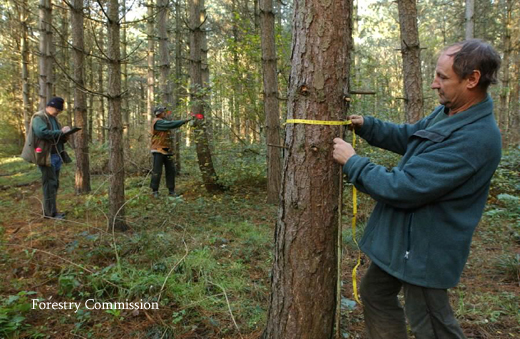UK: "More tree planting" say scientists
26.11.09
A panel of scientists met over the last two days to make recommendations for a giant tree planting scheme in the UK. The UK has only 12% tree coverage - a measly amount when compared with the rest of Europe (37%), Finland (74%), and North and Central America (33%).
The scientists concluded that if an extra 4% of the UK's land was planted with new woodland over the next 40 years, it could lock up 10% of the nation's predicted greenhouse gas emissions by the 2050s.
The panel, chaired by Professor Sir David Read, recently Vice-President of the Royal Society and currently Emeritus Professor of Plant Sciences at the University of Sheffield, was tasked by the Forestry Commission to make the assessment - believed to be the first national study of its type in the world.

Speaking at an event in London yesterday to publish the report, Professor Read said: "All our research points to the fact that forestry can make a significant and cost-effective contribution to meeting the UK's challenging emissions reduction targets.
"By increasing our tree cover we can lock up carbon directly. By using more wood for fuel and construction materials we can make savings by using less gas, oil and coal, and by substituting sustainably produced timber for less climate-friendly materials.
"While so many emissions reduction measures have negative connotations, tree planting can be a win, win, win solution: people love trees, we benefit from them in so many different ways, and now we know they could play a significant part in reducing the UK's carbon dioxide emissions."
The report suggests that appropriate planting of 23,000 hectares a year
- equivalent to about 30,000 football pitches - over 40 years would involve changing the use of only 4% of the UK's land and would mean increasing tree planting by 200% on current levels. It would bring woodland cover in the UK to 16% - still well below the European average.
It is important that our forests of the future are adapted to and can withstand the effects of climate change and the Forestry Commission is currently experimenting with non-native species, such as walnut, which may form much of the future planting. "Further research is urgently needed to establish which species will be best suited to the changed environmental conditions," said the panel.
This policy may not be met with cries of joy from some quarters, but it seems that landscape and species composition change is an undeniable symptom of a changing climate. Phenologist - a scientist who studies the timings of natural events - Prof. Tim Sparks said at the recent Botanic Garden Education Network (BGEN) conference that events such as leafing and flowering "were advancing by three days per decade."
It is becoming well understood how crucial trees are in the climate fight but their other benefits - biodiversity, recreation, and watersheds - must not be underestimated or forgotten. Campaigners will be watching this news closely, particularly because to many "a plantation is not a forest", but given the Forestry Commissions recent conservation driven activities this hopefully won't be cause for concern.
Related links:
23.09.09
 Two days ago news of the “International Day Against Tree Monocultures” arrived in my email via the World Rainforest Movement (WRM). There seems to be a Day for everything and I couldn’t help but chuckle inwardly at the thought of marching to some local forestry and hurling abuse at some conifer or other.
Two days ago news of the “International Day Against Tree Monocultures” arrived in my email via the World Rainforest Movement (WRM). There seems to be a Day for everything and I couldn’t help but chuckle inwardly at the thought of marching to some local forestry and hurling abuse at some conifer or other.
UK: Cutting down trees in the name of conservation
11.09.09
In an unusual twist of irony the Forestry Commission plan to fell 170,000 trees in the name of conservation.
UK: Britain’s forests reveal their secrets
08.09.09
 Britain’s woodlands have gone through a tumultuous past and now look set to become a vital part of the future. A new survey by the Forestry Commission of the estimated 2.75 million hectares (or 12 per cent of the land area) of woodland in Britain will form the most comprehensive record of them ever.
Britain’s woodlands have gone through a tumultuous past and now look set to become a vital part of the future. A new survey by the Forestry Commission of the estimated 2.75 million hectares (or 12 per cent of the land area) of woodland in Britain will form the most comprehensive record of them ever.
UK: Wildlife returns to flooded bog
14.08.09
A huge restoration project to bring back 12,000 year old bogs in Northumberland has been completed nearly two years ahead of schedule.